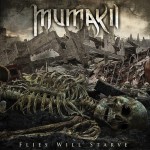“Redaction Artifacts” is the third release from New Jersey’s East of the Wall and sees them further reinventing themselves after their instrumental “Farmer’s Almanac” debut and “Ressentiment” and “The Apologist” albums. The albums opener ‘Solving the Correspondence Problem’ is densely textured yet exhilarating. It almost leads the listener in to a false sense of security however as the mood and atmosphere quickly changes to aggression and bombast. A few minutes later however, the mood changes again and the vocals mellow giving ‘I’m Always Fighting Drago’ an exciting duality of sound. At that may be the beauty of this release in that there are myriad melodies and atmospheres created which appear to seamlessly weave together to create the glorious whole. If one were looking for a release to help with a definition of ‘progressive music” then this would go a long way to help.
‘Obfuscator Dye’ has a level of technical ability that would not look out of place on a late King Crimson release, and mood changes that hold the listeners interest and bring the music up out of the run of the mill “progressive” outfit. The three guitar approach is used to dramatic effect as they hazily weave through the music creating what at one moment may seem to be discordant noise but which effortlessly mutates into delicately arranged yet striking compositions. ‘The Fractal Canopy’ (the song titles themselves are deliciously enigmatic) carries on this theme of melting together technically electrifying musicianship that turns from genre to genre within a matter of moments. Any “prog head” will be more than satisfied with the escalating tension and glorious crescendo to this piece.
‘The Fractal Canopy’ is the track on the album that makes the interested listener think, “This is the track that would make me want to experience East of the Wall live in concert”. ‘Excessive Convulsive’ (another superb track title) is another example of this. Imagine how utterly thrilling it would be to hear these riffs cavorting around each other in a live setting? The production is sharp and allows each individual instrument space to shine, and is somewhat reminiscent of a jazz album production, which may or may not have been the intention, but perfectly suits the compositional style on “Redaction Artifacts”….



















![Talisman – I-Surrection [Review]](http://www.thisisnotascene.com/wp-content/uploads/2013/08/Talisman-I-Surrection-300x300.jpg)














![United Ghosts – United Ghosts [Review]](http://www.thisisnotascene.com/wp-content/uploads/2013/07/united-ghosts-united-ghosts-150x150.jpg)










